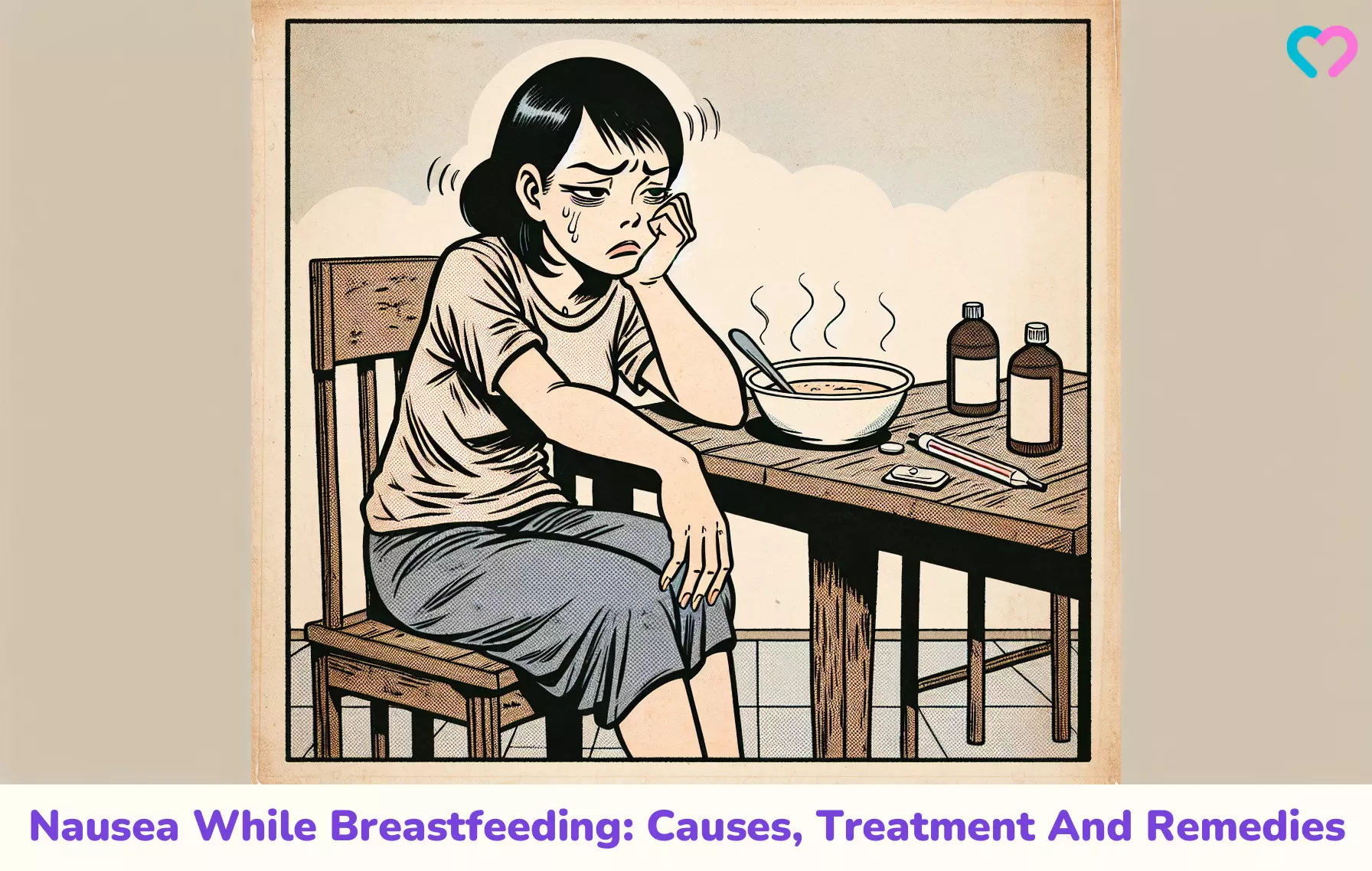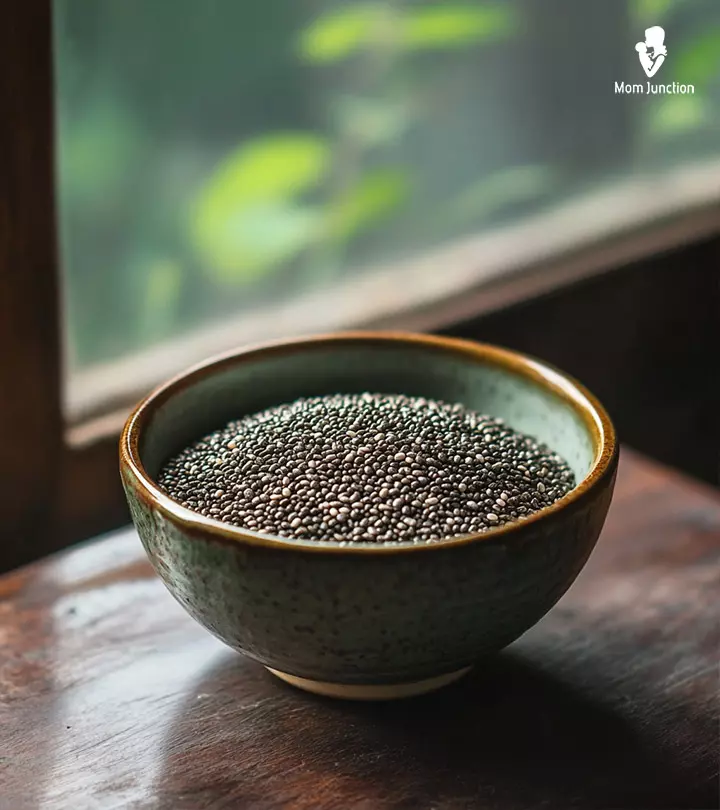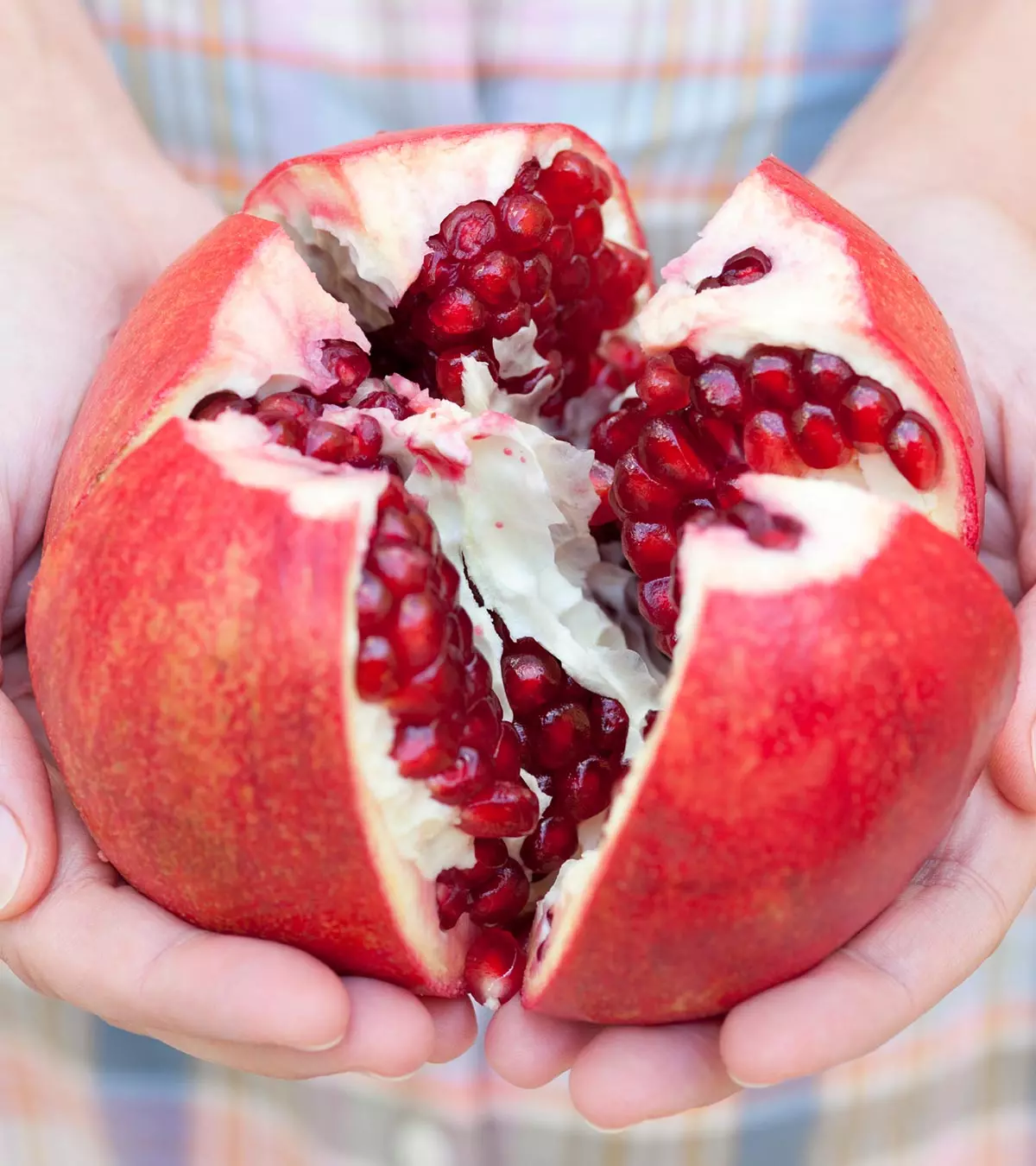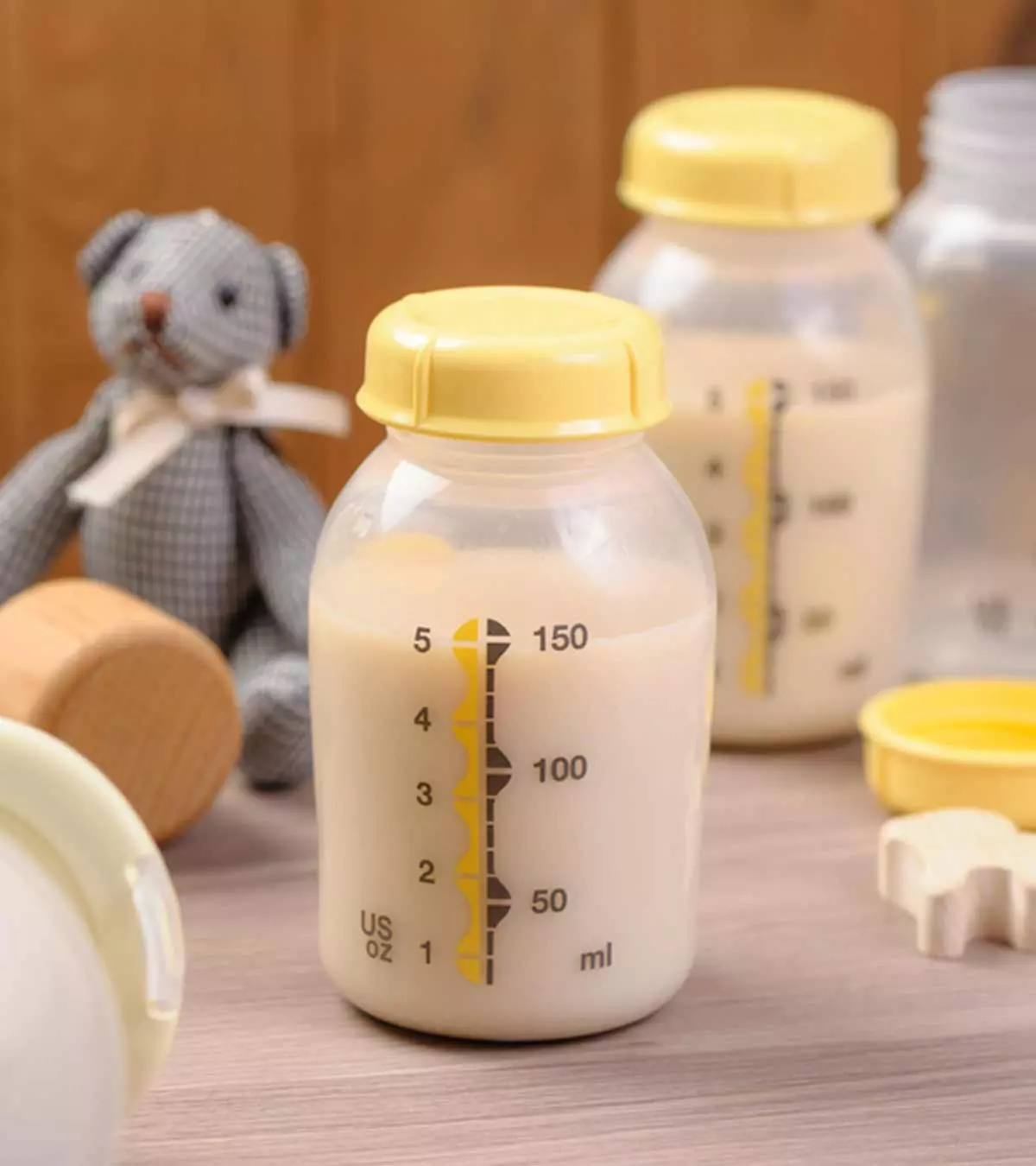
Image: ShutterStock

Nausea is an unpleasant sensation that may cause a strong urge to vomit. While it is common during pregnancy, some women may also experience nausea when breastfeeding (1). Nausea after childbirth may be related to lactation, but it may not be as common during pregnancy. Nausea while breastfeeding can be uncomfortable and can make feeding difficult. While not all mothers experience it, nausea can impact daily routines and overall well-being. This issue may arise due to factors such as hormonal changes, fatigue, and dehydration, and it’s important to address it to ensure a positive breastfeeding experience. Read this post as we bring information about home remedies, medications, causes, and tips to prevent nausea during breastfeeding.
Key Pointers
- Hormonal changes, dehydration, lack of a good diet, and fatigue can cause nausea in breastfeeding mothers.
- Having ginger or peppermint tea, sucking on a lemon, drinking plenty of water, and sniffing aromatic oils can relieve nausea.
- Munching on crackers or nuts ensures that you’re not feeding your baby on an empty stomach, which can also cause nausea.
- Home-made fresh juices and proper rest and sleep can help alleviate nausea.
Does Breastfeeding Make You Nauseous?
Breastfeeding does not directly cause nausea. But various factors associated with breastfeeding or milk letdown might trigger the condition in some women. For instance, lifestyle changes and hormonal changes could cause nausea. We will give you more details about the reasons, later in the post.
Home Remedies For Nausea In Nursing Mothers
The following natural remedies are traditionally used, while their efficacy is mostly anecdotal.
1. Ginger tea

Ginger tea might be helpful in reducing nausea. Moreover, ginger is also a proven “galactagogue,” which means it helps increase breast milk production (2). Above all, ginger may benefit overall maternal health, which might also play a role in alleviating nausea.
2. Peppermint tea
Some women find peppermint tea refreshing. The US Food and Drug Administration (FDA) categorizes peppermint tea as “generally recognized as safe” (GRAS). However, consuming an excess of peppermint tea could exacerbate nausea and may lead to heartburn and vomiting (3).
3. Aroma oils
Anecdotal evidenceiThe evidence based on individual experiences and observations. suggests that smelling some aroma oils like those made from lemon, spearmint, cardamom, etc., might help in relieving nausea. Studies on new and expectant mothers indicate that aromatherapy using lavender essential oil was effective in reducing symptoms of nausea and vomiting (18). Peppermint essential oil has also been proven to have similar effects in remedying nausea and vomiting (19). It is suggested to use them in moderation and keep at a safe distance from the baby to avoid accidental ingestion.
4. Others
- Sucking on a slice of lemon.
- Eating small meals throughout the day to prevent your stomach from becoming empty.
- Having instant carbs such as a rusk or toast.
- Consuming water during breastfeeding helps relieve most of the gastric distress and complaints. You can either have it plain, boiled or infused with cucumber, mint leaves, lemon, etc.
Consult your doctor or a lactation consultant before using these home remedies. Stop using them if you find any reduction or alteration in breast milk production or if you notice any effects on the baby.
 Quick tip
Quick tipCan You Take Medicines For Nausea When Breastfeeding?

Never self-medicate, but consult a doctor if your condition doesn’t improve. Doctors usually prescribe domperidoneiMedication used to treat nausea and vomiting and allows the food move easily through the stomach. and metoclopramideiMedication used to treat stomach and intestinal issues. as they are considered safe and are not known to adversely affect the breastfed infant. However, they should be used for a short time and only on a doctor’s prescription. Monitor the nursing infant for a few hours after taking medicine to see if there are any adverse effects such as drowsiness, etc. (4).
What Causes Nausea When Breastfeeding?
Here are some possible reasons for feeling nauseous when breastfeeding:
1. Oxytocin
Oxytocin is a hormone that signals the mother’s breast to release milk, and the phenomenon is known as “milk let-down” or “milk-ejection reflex.” The hormone can lead to certain changes in a mother’s body, with nausea being one of them (5).
2. Dehydration
Dehydration when breastfeeding
can happen in nursing mothers because of the loss of fluid. It might lead to nausea (6).
3. Hunger
On average, a breastfeeding mother needs 400 to 500 extra calories a day (7). Insufficient diet to meet the extra demand for calories can lead to hunger. An empty stomach makes you feel nauseous. Hunger can also increase the risk of acid reflux, which might lead to heartburn and nausea when breastfeeding.
4. Fatigue
New mothers often have insufficient sleep and experience fatigue. These conditions might add up to the other triggers to make you feel nauseous. Fatigue and stress may also cause problems with lactation and nursing, which may, in turn, cause mastitisiA condition characterized by breast engorgement, pain, tenderness, swelling, redness, heat, fever, chills, and nausea and nausea (20).
5. Increased demand for milk

As the baby grows, their requirement for breastmilk increases. The increase in breast milk supply and production can further alter the hormones, thus increasing the chances of nausea. In rare cases, the mother’s body may lack the calories, carbohydrates, and glycogen needed to produce the increasing supply of breast milk. It can cause the body to rely on substances called ketones derived from fat tissue. Excess creation of ketones can lead to a condition called lactation ketoacidosis, which may cause general malaise, vomiting, and nausea when breastfeeding (21).
6. Postpartum depression
Postpartum depression is a common but serious health concern that affects several mothers. According to a US Centers for Disease Control and Prevention (CDC) survey, 13.2% of women reported experiencing postpartum depressive symptoms (PDS) in 2018 (22).
For those with symptoms, the doctor might prescribe antidepressants to mothers experiencing post-natal depression. These medicines are safe for the baby but might cause nausea as a side effect (8).
7. Pregnancy
If nausea and vomiting continue even for several weeks or months after delivery, then take a pregnancy test. Nausea might occur due to a new pregnancy. Although most women experience nausea in pregnancy, it worsens when you are both pregnant and breastfeeding (9). Some women who have experienced pregnancy complications such as hyperemesis gravidarum (HG) or extreme vomiting during pregnancy may also continue to experience nausea when breastfeeding (23).
8. Low blood sugar
New mothers may sometimes forget to look after themselves after having a baby and might not get the necessary nutrition. If you’re not eating right and at the right time during this period, your blood sugar levels could drop, leading to nausea. So, it’s crucial to pay attention to your diet while breastfeeding to make sure you and your baby get the proper nutrition. If you’ve been forgetting to eat, consider making some changes in your routine. You can seek help from friends and family so you can also focus on yourself.
 Quick fact
Quick factTips To Prevent Nausea When You Are Breastfeeding
The following tips might help you prevent nausea when you are breastfeeding.
1. Avoid dehydration. Have sips of water throughout your breastfeeding session. You may also drink homemade sugar-free fresh juices, soups, broths, etc., to keep yourself hydrated (24).
2. Snack on something light. Nausea may at times interfere with your ability to finish your meals. Keep some munchies like crackers, nuts, pitted berries, chopped fruit, dried fruits, etc., handy to munch on them when you are hungry (24).
3. Eat wholesome and nutritious food. Avoid junk food, greasy, fatty, and spicy food, as it can lead to gastric distress and issues, such as gastroesophageal reflux and nausea, and dyspepsiaiAlso called indigestion, this causes discomfort or pain in the upper abdomen (24).
4. Take rest whenever you can. Sleep when the baby sleeps and seek help from family and friends. Getting adequate rest can keep fatigue at bay and aid in lactation.
5. Avoid the things that trigger nausea. Nausea during breastfeeding can also be managed like you would have managed nausea during pregnancy. Avoid foods with pungent smells or strong flavor profiles and foods that you find yourself averse or allergic to.
6. Seek help from professionals. Your midwife or gynecologist can help you monitor your postpartum recovery and prescribe appropriate medications if required. A dietician may be able to help you identify your triggers and design a personalized diet plan accordingly, and a lactation consultant may help you tackle feeding difficulties and ensure your baby’s needs are met (23).

Frequently Asked Questions
1. Is nausea a symptom of mastitis?
Nausea can be present with mastitis. Although nausea can be a symptom of mastitisiBreast tissue infection causing redness, pain, and swelling in the breast. , it is not specific since it can be associated with various reasons in the postpartum period. Nausea can be present with breast tenderness, warmness, pain or soreness, and flu-like symptoms such as fever, fatigue, and body ache in mastitis (10).
2. Why does breastfeeding make my stomach upset?
Breastfeeding can cause cramping abdominal pain, often interpreted as stomach pain or stomach upset in immediate postpartum days. This can be due to the release of hormones that cause uterine contractionsiMuscle contractions in the uterus that happen during periods and labor. while breastfeeding. These hormones help the uterus shrink and return to its normal size over time (11). This means breastfeeding plays a role in the shrinking of the postpartum belly.
3. How much water should I drink while breastfeeding?
Sipping water helps reduce nausea. It is recommended to consume 3.8 liters of water per day during breastfeeding. This is more than the daily water requirement for non-pregnant and pregnant women. You may increase water intake by 800mL/day in the first six months postpartum, that is, during exclusive breastfeeding, and 650mL/day after six months to balance the water loss from the body through breast milk (12).
4. Could certain medications or supplements make breastfeeding-related nausea worse?
Certain dietary supplements prescribed during lactation, such as calcium and vitamin D, may cause nausea, particularly if taken on an empty stomach. Taking them with food may ease the discomfort (13).
5. Is it safe to continue breastfeeding if I feel nauseous?
Yes. It is safe to continue breastfeeding even when feeling nauseous. In case the underlying cause of nausea requires medication, ask the doctor to prescribe lactation-safe medicines that do not affect the baby.
Just when you think you are liberated from the symptoms of morning sickness of pregnancy, you may be taken aback when you experience nausea when breastfeeding. Although it is uncommon, some women may have nausea after delivery while nursing their infant. Changes in your routine or hormones could be to blame for this. However, you may easily manage this condition with some home care tips and precautions. If you are concerned about nausea while breastfeeding, you may consult a doctor or speak to a lactation consultant to determine the causes and treatment options.
Infographic: Tips To Prevent Nausea For Breastfeeding Mothers
Nausea, commonly perceived as a classic pregnancy sign, is not limited to pregnancy but could make a comeback postpartum too. Hormonal factors could make you nauseous while breastfeeding, which is manageable with simple home-care measures. So, follow the tips in the infographic below to prevent nausea during your nursing sessions.
Some thing wrong with infographic shortcode. please verify shortcode syntax
Illustration: Nausea While Breastfeeding: Causes Treatment And Remedies

Image: Dall·E/MomJunction Design Team
References
1. Noel M. Lee and Sumona Saha, Nausea and Vomiting of Pregnancy; US National Library of Medicine
2. Paritakul P et al., The Effect of Ginger on Breast Milk Volume in the Early Postpartum Period: A Randomized, Double-Blind Controlled Trial; US National Library of Medicine
3. Peppermint; National Center for Biotechnology Information, U.S. National Library of Medicine
4. Treating nausea during breastfeeding; National Health Service.
5. Kerstin Uvnas Moberg and Danielle K. Prime, Oxytocin effects in mothers and infants during breastfeeding; The Infant Journal
6. Dehydration; US National Library of Medicine
7. Maternal Diet and Breastfeeding. US National Library of Medicine
8. Postnatal depression; Mental Health Foundation of New Zealand
9. Pregnant and Breastfeeding?; La Leche League
10. Plugged Ducts, Mastitis, And Thrush; WIC Breastfeeding Support
11. Nursing Cramps; HealthyChildren
12. Saptawati Bardosono, et al; 2016; Fluid Intake of Pregnant and Breastfeeding Women in Indonesia: A Cross-Sectional Survey with a Seven-Day Fluid Specific Record; National Library of Medicine
13. Get Nauseous After Taking Vitamins? 6 Tips to Make Them Easier to Stomach.
14. Nancy M. Steele et al.; Effect of Acupressure by Sea-Bands
on Nausea and Vomiting of Pregnancy; Journal of Obstetric, Gynecologic & Neonatal Nursing
15. Potential Postpartum Complications; Beaumont Hospital
16. Albert T. Liu et al.; Probiotics Improve Gastrointestinal Function and Life Quality in Pregnancy; National Center for Biotechnology Information, U.S. National Library of Medicine
17. Pelin Basım and Yaşar Özdenkaya; Can Traditional Fermented Food Products Protect Mothers Against Lactational Mastitis; National Center for Biotechnology Information, U.S. National Library of Medicine
18. Heather Tran; Complementary and Alternative Medicine: The Effects of Aromatherapy on New and Expectant Mothers; Dominican University of California
19. Christine Lyford; Natural Remedy Use During Pregnancy, Labor, and Breastfeeding; Liberty University
20. Breast Mastitis; The Children’s Hospital of Philadelphia
21. Sarah Gleeson, Eoin Mulroy, and David E Clarke; Lactation Ketoacidosis: An Unusual Entity and a Review of the Literature; U.S. National Library of Medicine
22. Vital Signs: Postpartum Depressive Symptoms and Provider Discussions About Perinatal Depression — United States, 2018; Centers for Disease Control and Prevention
23. Breastfeeding After HG: Resources to Be Informed and Prepared; HER Foundation
24. Your Guide to Breastfeeding; U.S. Department of Health and Human Services
Community Experiences
Join the conversation and become a part of our nurturing community! Share your stories, experiences, and insights to connect with fellow parents.
Read full bio of Rebecca Koyf
Read full bio of Dr. Ritika Shah
Read full bio of Swati Patwal
Read full bio of Ghazia Shah
















